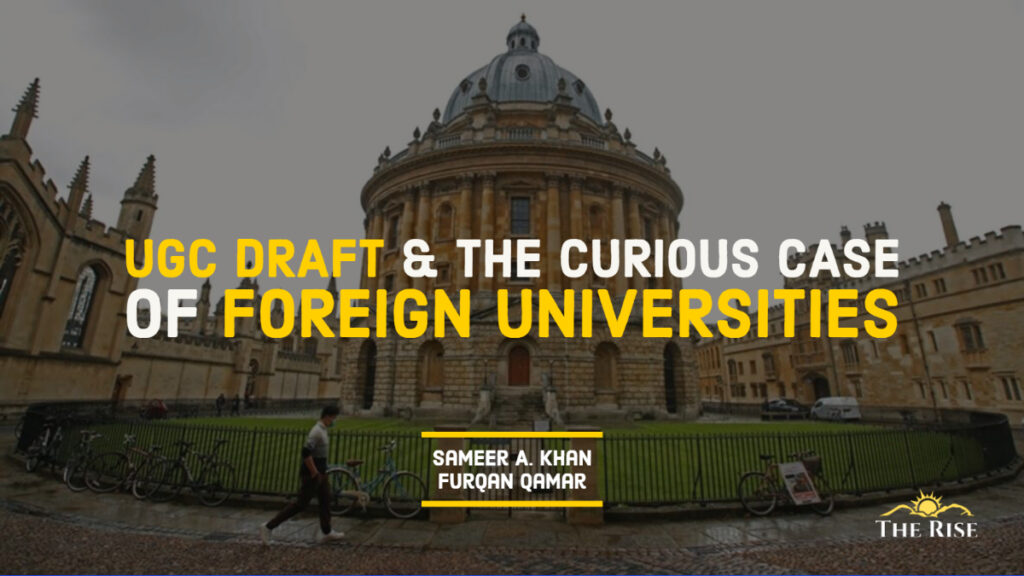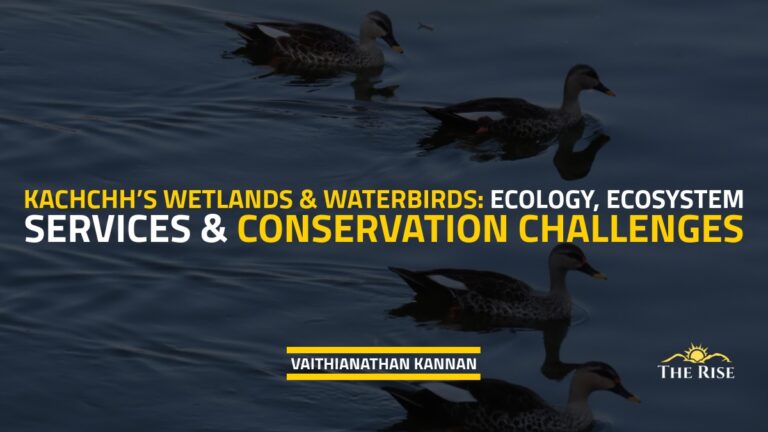The UGC, coming up with a regulation to allow foreign universities to set up their off-shore campuses in India, has had academics at sixes and sevens and divided. While one stratum welcomes the move saying it would increase job prospects, foreign collaborations, and the research environment in the country, the other believes it will sound the death knell for the home universities. It is strongly felt that Ivy League universities and colleges are unlikely to apply for setting up their campuses in India. India must desist from the temptation of attracting substandard universities that would dupe Indian people out of their money in the name of dazzling foreign degrees.
"Would you tell me, please, which way I ought to go from here?” , Asks Alice in the Wonderland. "That depends a good deal on where you want to get to," said the Cheshire Cat. "I don't much care where," said Alice. "Then it doesn't matter which way you go," said the Cat. "–so long as I get SOMEWHERE," Alice added as an explanation. "Oh, you're sure to do that," said the Cat, "if you only walk long enough."
The above dialogue gives the most profound life lesson: Goal setting and planning, evaluating alternative options and choices, analysing their pros and cons and coming up with a course of action. But for these, doubts and confusion are going to abound. We shall sure reach somewhere but not necessarily where we ought to have reached.
The University Grants Commission (UGC) has come up with a regulation to allow foreign universities to set up their off-shore campuses in India. But then there is a catch: They have to offer the same quality of education as they do on their home turf but must also comply with any conditions that the UGC or the Government of India may prescribe from time to time. To begin with, they must not offer courses that could come in the way of national interests.
This move has had academics at sixes and sevens and divided. While one stratum welcomes the move saying it would increase job prospects, foreign collaborations, and the research environment in the country, the other believes it will sound the death knell for the home universities.
Also Read: Academia Wary of New UGC Regulations for PhD
While one stratum welcomes the move saying it would increase job prospects, foreign collaborations, and the research environment in the country, the other believes it will sound the death knell for the home universities.
The Optimism
The idea has been applauded for its potential to home-deliver world-class higher education to Indian students at substantially lower prices. It is claimed that such foreign HEIs would come as a big boon to those students who are unable to go overseas because of “financial or family constraints”.
Further, the entry and operation of foreign universities are claimed to foster healthy competition among domestic higher education institutions, which would in turn significantly enhance the overall quality of higher education.
It has also been argued that the availability of global programmes on home turf would not only afford opportunities for quality higher education but would also go a long way in promoting a conducive research environment. Some have stretched their imagination to indicate that the entry and operation of foreign HEIs will stop the menace of brain drain.
A few hope that foreign HEIs would set an example of a truly international higher education by providing good job opportunities, perks, and positions to the academic community, here in India.
Also Read: The New Geopolitics Of Global Education
It has been argued that the availability of global programmes on home turf would not only afford opportunities for quality higher education but would also go a long way in promoting a conducive research environment.
Top Universities Seldom Go Offshore
On the other hand, the idea has been challenged rather vociferously. Best universities in the world have seldom been keen to go offshore. It is strongly felt that Ivy League universities and colleges are unlikely to apply for setting up their campuses in India and subject themselves to the scrutiny of the standing committee that is proposed to be constituted under the regulation.
These institutions have made heavy investments in their reputations and brand buildings. They are quite wary of the potential consequences of setting up foreign campuses in different kinds of regulatory regimes.
They are not motivated by pecuniary and materialistic conditions and are under no pressure for revenue maximisation. Many feel that they would be surprised if any of the top 100 universities in the world would venture to seek permission to enter India.
In rare instances, they have set up offshore campuses in a few countries but only if the host countries have subsidised them heavily. It may neither be feasible nor desirable for India to offer such subsidies. The country should instead invest in domestic HEIs to improve their quality.
Also Read: An Era of Dynamism in Higher Education
The Apprehensions
Academics and industry experts suspect the practical feasibility of the proposal. They feel that ‘no business case can be developed for any of the reputed foreign HEIs to open a branch in India to provide higher education with the same quality and efficiency’.
They further argue that most Indian students go abroad with the monetary motive of settling in a foreign land and earning dollar salaries. The quality of life that they enjoy in those countries acts as another magnet. They feel that the easiest route to work visas, permanent residency or even citizenship is through studies abroad.
At the same time, questions are being asked about the wisdom behind downgrading the benchmark requirements for the entry and operation of foreign HEIs. The new education policy (NEP 2020) had reached a considered view that India should take legislative measures to invite and facilitate the top 100 universities of the world. Extending the offer to the top 500 foreign HEIs – by any ranking, either overall or in any discipline or just being ‘reputed’ in their home country may lead to an influx of poor-quality institutions which might cause more harm than good.
Also Read: Decadence of University Education in India: The Unseen Compromises
India must desist from the temptation of attracting substandard universities that would dupe Indian people out of their money in the name of dazzling foreign degrees.
Few feel that tier-2 foreign HEIs would serve the purpose and that it is not all rays of sunshine and rainbows in the foreign land. India must, therefore, desist from the temptation of attracting substandard universities that would dupe Indian people out of their money in the name of dazzling foreign degrees.
It is feared that the lesser-known universities would probably be the keenest in setting up their offshore campuses either through direct investment or through a joint venture or franchise kind of arrangement. Some feel this move could be a beginning of an end for our universities and needs to be seen as a warning signal, if not an ultimatum, for domestic HEIs.
Also Read: Academic Collaboration of Indian and Foreign Institutions Needs Soul-Searching
Few from the side of foreign higher education providers have reacted publicly. Those who have, see it as a welcome development but would prefer to wait and watch as to how details unfold.
The draft regulation is also self-contradictory. For instance, it says that the education provided in India should be of the same quality as at their main campus. This would require paying people the same amount as they do at their main campus, which in turn will increase the operational expense, whose burden would fall on the students. The cost of it would be so high that it might produce a “decoy effect“, where people might be motivated to spend a little more for a better experience at the original campus.
A lot of universities in the top 500 are substandard and not even at par with the home universities. IISc Bangalore, despite being a superior institution, is ranked lower (at 155) compared to King AbdulAziz University of Saudi Arabia (at 105) on the QS Ranking.
Also Read: Why do Indians Go Abroad for Higher Education?
Another critical element of the regulation would be the eligibility factor of the universities we allow to enter the Indian market. A lot of universities in the top 500 are substandard and not even at par with the home universities. Take universities in the Gulf, for example. King Abdul Aziz University of the Kingdom of Saudi Arabia is ranked no. 105 on the QS Ranking, whereas, the Indian Institute of Sciences, Bangalore is ranked 155. It doesn’t take a genius to know that IISc, Bangalore is a superior institution, yet is ranked lower. So, it will be interesting to see how UGC plans to solve this conundrum.
It is extremely difficult to say whether these universities will jump the gun and enter Indian markets since it depends upon how the Indian higher education market responds to this change. But what needs to be done before any of that happens is to make our policy and regulations foolproof. The policy framework should be made fool-proof so that desired objectives are achieved.
Disclaimer: The views expressed in this article are of the authors solely. TheRise.co.in neither endorses nor is responsible for them. Reproducing this content without permission is prohibited.










































Pingback: Protectionist UK Restricting Indian Students May Backfire
Pingback: American Dream in Doldrums: Scrapping OPT, Students to Opt out?